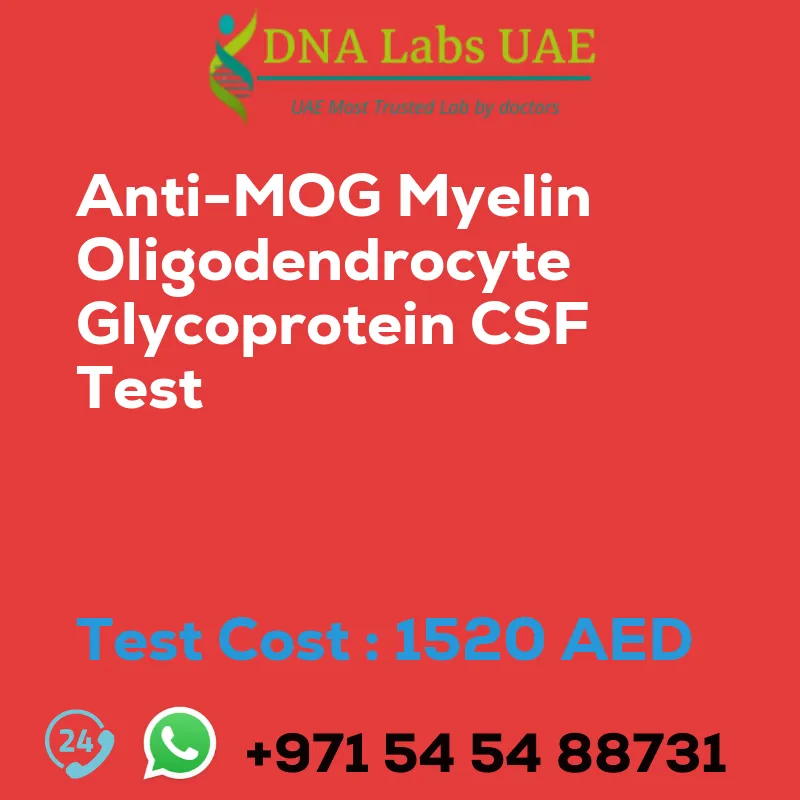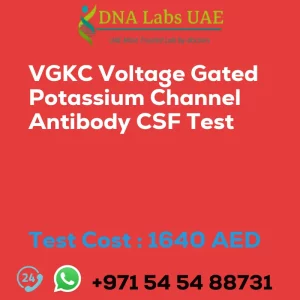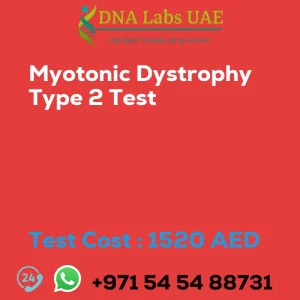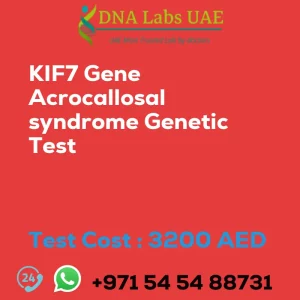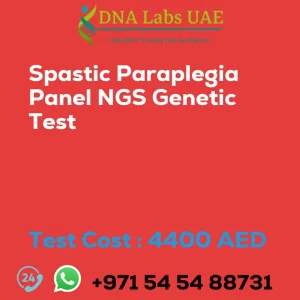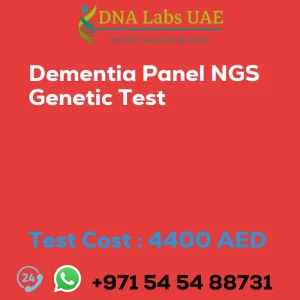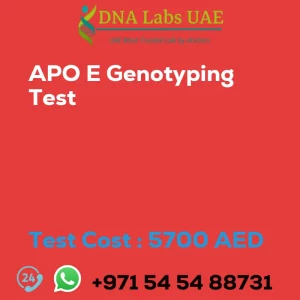ANTI-MOG MYELIN OLIGODENDROCYTE GLYCOPROTEIN CSF Test
At DNA Labs UAE, we offer the ANTI-MOG MYELIN OLIGODENDROCYTE GLYCOPROTEIN CSF test at a cost of AED 1520.0. This diagnostic tool helps detect the presence of antibodies against the myelin oligodendrocyte glycoprotein in the cerebrospinal fluid (CSF).
Test Details
The Anti-MOG (Myelin Oligodendrocyte Glycoprotein) CSF test is primarily used to aid in the diagnosis of autoimmune neurological disorders, such as neuromyelitis optica spectrum disorder (NMOSD) and optic neuritis. These conditions are characterized by inflammation and damage to the optic nerves and spinal cord.
The presence of anti-MOG antibodies in the CSF can help differentiate NMOSD from other similar neurological disorders, such as multiple sclerosis (MS). While both NMOSD and MS can cause optic neuritis and myelitis, the presence of anti-MOG antibodies is more specific to NMOSD.
The test involves collecting a sample of CSF through a lumbar puncture (spinal tap) procedure. The CSF sample is then analyzed in our laboratory using techniques like enzyme-linked immunosorbent assay (ELISA) or cell-based assays to detect the presence of anti-MOG antibodies.
It is important to note that the Anti-MOG CSF test is not a stand-alone diagnostic tool, and the results should be interpreted in conjunction with other clinical findings and imaging studies. Our team of neurologists and healthcare professionals will evaluate the test results in the context of the patient’s symptoms and medical history to make an accurate diagnosis.
Test Components and Price
– Test Name: ANTI-MOG MYELIN OLIGODENDROCYTE GLYCOPROTEIN CSF Test
– Components: Cell based assay, IFA
– Price: AED 1520.0
Sample Condition and Report Delivery
– Sample Condition: 1 mL (0.5 mL min) CSF in a sterile screw capped container. Ship refrigerated or frozen.
– Report Delivery: Sample collected on Tue/Fri by 9 am; Report delivered on the same day.
Pre Test Information
No special preparation is needed for the ANTI-MOG MYELIN OLIGODENDROCYTE GLYCOPROTEIN CSF test.
Test Department
The ANTI-MOG MYELIN OLIGODENDROCYTE GLYCOPROTEIN CSF test is conducted in our Immunopathology department.
Contact a Neurologist
If you are experiencing symptoms related to autoimmune neurological disorders or need further information about the ANTI-MOG MYELIN OLIGODENDROCYTE GLYCOPROTEIN CSF test, we recommend consulting a neurologist. Our team of experts is dedicated to providing accurate diagnoses and personalized treatment plans.
| Test Name | ANTI-MOG MYELIN OLIGODENDROCYTE GLYCOPROTEIN CSF Test |
|---|---|
| Components | |
| Price | 1520.0 AED |
| Sample Condition | 1 mL (0.5 mL min) CSF in a sterile screw capped container. Ship refrigerated or frozen. |
| Report Delivery | SampleTue / Fri by 9 am; Report Same day |
| Method | Cell based assay, IFA |
| Test type | Disorders of Nervous System |
| Doctor | Neurologist |
| Test Department: | IMMUNOPATHOLOGY |
| Pre Test Information | No special preparation needed. |
| Test Details |
The Anti-MOG (Myelin Oligodendrocyte Glycoprotein) CSF test is a diagnostic tool used to detect the presence of antibodies against the myelin oligodendrocyte glycoprotein in the cerebrospinal fluid (CSF). Myelin oligodendrocyte glycoprotein is a protein found in the central nervous system, specifically in the myelin sheath that surrounds nerve fibers. This test is primarily used to aid in the diagnosis of certain autoimmune neurological disorders, such as neuromyelitis optica spectrum disorder (NMOSD) and optic neuritis. These conditions are characterized by inflammation and damage to the optic nerves and spinal cord. The presence of anti-MOG antibodies in the CSF can help differentiate NMOSD from other similar neurological disorders, such as multiple sclerosis (MS). While both NMOSD and MS can cause optic neuritis and myelitis, the presence of anti-MOG antibodies is more specific to NMOSD. The test involves collecting a sample of CSF through a lumbar puncture (spinal tap) procedure. The CSF sample is then analyzed in a laboratory to detect the presence of anti-MOG antibodies using techniques like enzyme-linked immunosorbent assay (ELISA) or cell-based assays. It is important to note that the Anti-MOG CSF test is not a stand-alone diagnostic tool, and the results should be interpreted in conjunction with other clinical findings and imaging studies. A neurologist or other healthcare professional will evaluate the test results in the context of the patient’s symptoms and medical history to make an accurate diagnosis. |

